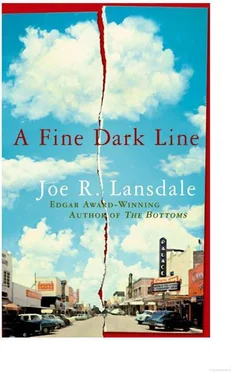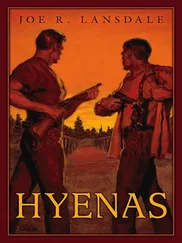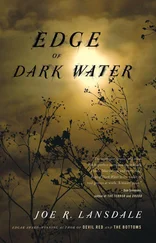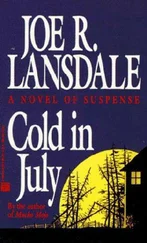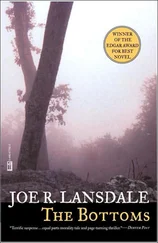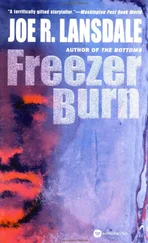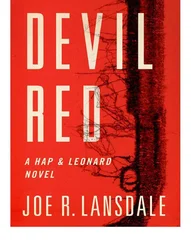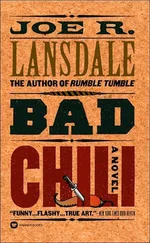“They ain’t gonna miss this stuff. And I’ll bring it back.”
“Well, you better go on with it, let me get back to my janitorin’.”
“Thanks, Jukes,” Buster said.
“Guess you welcome. You my cousin, Buster, but you pushin’ it.”
“Who pulled your ass out of the fire about half a dozen times?”
“Yeah, well, you right. But I still need this job.”
“You got jobs all over the place,” Buster said.
Jukes dropped his cigarette in the alley and stepped on it. “I’m gonna go inside now. You might ought to go on, case one of the newspaper gentlemen comes out the back door and sees two niggers with a white boy.”
“You need to relax, Jukes.” “Yeah, right.”
“Hey, Jukes, for the boy here, hit a note or two.”
“Ah, now.”
“Come on.”
Jukes looked around. “Well, just a couple of notes.”
He took a harmonica from his back pocket, hit a few notes, pulled it from his mouth, and sang:
I got a two-timin’ woman.
I’m one-timin’ man.
She wants to get happy, but she don’t understand.
The harmonica came up, a few notes, then:
She a two-timin’ woman—
I’m one-timin’ man.
He hit a few notes on the harmonica, sang:
She tell Mr. Johnson, what he ought to do.
Mr. Johnson don’t listen.
He don’t care what she do.
It don’t matter darlin’, what you say.
Mr. Johnson, dadgumit, don’t play that way.
The harmonica again. A couple of tap steps. Then:
You say what you want.
You say what you say.
But I done told you darlin’
Mr. Johnson don’t play that way.
Jukes stopped, said, “That’ll do for now. Y’all be careful, hear.”
Jukes went inside.
Buster said, “How’d you like that?”
“Neat,” I said. It would be several years later, thinking back on that song, that I’d truly understand it. I wondered if old Jukes made it up.
“We got to walk, kid.”
He picked up the cardboard box, started off. I followed, pushing my bike.
I said, “Where are we going?”
“We gonna look at what I got in the box.”
“What’s that?”
“You gonna see. I had him puttin’ this together for me for a week or so, waitin’ on that leg of yours to get well. How is it?”
“It feels funny, but it doesn’t hurt.”
“That’s the muscles in it. They hadn’t got no workout till now. That bike ridin’ is the best thing for it.”
“I’m pushing it.”
“Walkin’ won’t hurt you none neither. That’s exercise, ain’t it?”
“Where are we going?”
“The Section.”
“What?”
“Well, you might know it better as Nigger Town. We gonna go to my house and study this stuff.”
10
WE CAME TO a red-brick street where the oaks grew thick and close on either side. When the wind blew the limbs of one tree it tapped against its cousin across the street.
As we walked, on our right, we passed a fenced-in park and a statue of Robert E. Lee on which jet-black crows nested and relieved themselves, splattering it with white goo. I noted that one pile of it had fallen into and hardened over Robert E. Lee’s right eye.
Behind the park was a cemetery containing the bodies of Civil War veterans. On some of the graves were little weather-faded Dixie flags and vases out of which poked the blackened and wilting stems of deceased flowers; on other graves were fresher blooms, among them roses bright as blood.
We hiked on until the street narrowed and there were bricks poking up willy-nilly where the weather had worked them loose and sometimes cracked them. Blades of grass had crept between many of the bricks, fallen over, and turned yellow.
Abruptly, the oaks changed. I realized for the first time the trees on Oak Street, as it was called, those closer into town, were pruned and preened and cared for. But as one went farther down Oak Street, into the Section, the oaks were twisted and some were diseased with blackened knots. All were as neglected as the old brick street.
It was the same tone for the colored graveyard that lay on the left side of the street behind the oaks, near where Dewmont Creek ran. There you could see stones leaning left and right. Many had fallen and some were busted. The grass was high and there were sprigs of trees growing, escaped from some stray acorn cast there by wind or a careless squirrel.
“It don’t look as good as that cracker graveyard, do it?”
“Sir?”
“The colored field. Where the colored are buried, boy. It don’t look as neat as that cracker yard where all them Dixie ducks is buried, does it?”
“No, sir.”
“We don’t keep it up. You know why?”
“No, sir.”
“ ’Cause come Halloween, white boys come in and push the stones over and break ’em. We better off not doin’ nothin’. Fixin’ a stone, cuttin’ down that grass, just attracts them fools. Ain’t nothin’ funnier or braver to them boys than pushin’ over some colored’s stone, or throwin’ it in the creek, breakin’ it up. They’re cowards too, boy. Tell you why. They know ain’t no colored gonna do anything to them out in the open, ’cause then you got the Kluxers, or some of their types. That ain’t brave, now is it?”
“No, sir. I guess not.”
“It ain’t. That’s what I’m tellin’ you. Listen to me. I’m learnin’ you somethin’ here.”
Along the street white faces began to disappear, replaced by colored faces. The cars at the curbs and up next to houses were for the most part older, the houses along the way less nice, some of them smaller than our living room back at the drive-in. They peeled paint, flapped porch boards, begged for shingles and window glass, leaned as if in desperate need of rest. There were outhouses out back of homes, no electric lines leading into most.
Sitting on porch steps, or porches, some settled in stuffed chairs from which the insides exploded in puffs of cotton like drooping nuclear clouds, were men, young and old. They wore their worn-out clothes with slouch hats like uniforms. Their faces looked as if they had survived a beating and expected another.
As we walked by one of the men called out.
“Did he follow you home, Buster?”
“He did,” Buster said.
“You gonna keep ’im?”
“Ain’t got no wife says I can’t.”
“I hear them little white boys is hard to train.”
“Naw,” Buster said. “Not if you whip ’em good with a sound piece of fishin’ cane and put down newspapers.”
“Whatcha gonna feed that boy?”
“Got it here in this cardboard box. Guts from the slaughterhouse. A hog’s head.”
“Hell, I want that hog’s head,” said one of the men. “Why don’t you kill him, Buster, let me have that bicycle?”
“Your fat ass would flatten that bicycle,” Buster said.
Laughter rose up, drifted away as we moved on.
I was, to put it mildly, becoming a bit nervous. What was I doing in the Section anyway? Had I lost my mind?
———
WE TOOK A SIDE STREET, passed some kids playing. One of them was a small boy with a snotty nose that had collected dust and made dirt roads from his nostrils to his lips. As we passed, he looked at us as if he might ask us for identification.
Alongside the railroad track we came to a small house the sick green color of our drive-in fence.
I pointed this out to Buster. He said, “It ought to look the same color. I took me some of the paint. It ain’t pretty, but it keeps it from peelin’ and it looks better than gray.”
There was a large stone step that led up to the porch. The house was simple but looked clean and cared for. The screen in front of the door was a new one and the windows were clean with shutters drawn back. There was a metal lawn chair on the porch. It too was painted the same ugly green.
Читать дальше
